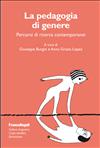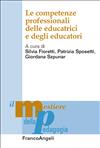In recent decades, the world of work has undergone radical changes that have led to a restructuring of productive activities, stimulating the demand for practitioners characterized by cognitive flexibility and the ability to realignment of its skills. In this scenario, it was necessary to rethink the models of the training courses of educational professions, characterized, more than others profession, from elements of fluidity and insecurity. Studies on the "modelling" in the building process of a professional role, have been developed, mainly in the educational physician field, while little is actually known about the building process of the educators role. This paper focuses on the study of tutorship and role models, as central to the process of development of "professional behaviors" learned during the internship experience, identifying in the tutor’s role the main functions to elaborate the possible models roles internalized or learned. The tutoring role in university training courses, is increasingly becoming a supporting role both in developing the ability to converse with the knowledge related to the action, and in facilitating the acquisition of styles and patterns of professional practices.




